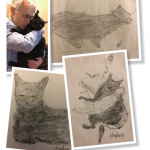I did my clinical fellowship in rheumatology at NIH, along with a fellowship in clinical immunology. During that time, I had the opportunity to do both basic and translational research with several senior investigators. We identified new clinical entities and described defective cytotoxic T and natural killer cell responses in patients with lupus.
I moved on and established my own laboratory at the Uniformed Services University and the Walter Reed National Military Center, Bethesda, Md., where I continued studying lupus and mechanisms of tissue injury until 2006. I was recruited to head the Department of Rheumatology and Clinical Immunology at the Beth Israel Deaconess Medical Center and to establish a lupus center.
Maria began a fellowship, followed by a residency in pathology at the National Cancer Institute (NCI). During her training, she frequently interacted with clinical investigators from the Arthritis Branch, presenting pathology findings at joint conferences. Later, alongside her primary role as a clinician scientist in NCI’s Pathology Laboratory—where her focus was primarily on the diagnosis and classification of pediatric tumors—she engaged in collaborative studies on vasculitis, RA and tissue injury. When I transitioned to Beth Israel, Maria joined our research group, and we have been working together during the past 15 years.
TR: Why do you study lupus?
Dr. Tsokos: Lupus and all other rheumatic diseases are incredibly complex. For most of them, we’ve made a lot of advances in the past 40 years, but lupus is now at an inflection point. We are on the brink of an explosion of new information and therapeutic breakthroughs. It has taken a long time to reach this point, and I think now is the time to study lupus.
Lupus is clinically and pathogenically very heterogeneous. We need to recruit investigators with diverse expertise to advance our understanding of the origin and nature of the disease and develop novel therapeutics. We need to entice strong, skilled, talented and committed individuals into the field at the start of their clinical training, whether in medical school, residency or fellowship, so they can help shape the future of lupus research and care.
TR: What is your take on the importance of rheumatology education?
Dr. Tsokos: Albert Einstein said, ‘It is nothing short of a miracle that modern methods of instruction have not yet entirely strangled the holy curiosity of inquiry.’
We need instruction, but it’s more important to instill curiosity and excitement and passion to ask and address important questions. And that’s what I call education: asking questions. Asking good questions is how you learn.

